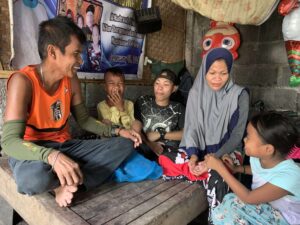
Every day, Tato Sangkopan begins his day fulfilling his duties and responsibilities as a Camp Safety Officer. He patrols the ground, ensures the safety of the camp’s inhabitants, and upholds the peace that was once hard-fought. Tato is no stranger to hardship, but today, his focus is redirected to a passionate mission: to build a peaceful community and a better future for his family.
“My children couldn’t enroll in Grade 1 because they had no birth certificates, and we couldn’t apply for 4Ps because my wife and I did not have our birth certificates.”
A decommissioned combatant from the municipality of Sultan Kudarat, Maguindanao, Tato is also a father to four children and harbors a simple yet powerful dream: providing a brighter future for his family. This desire, however, was overshadowed by a harsh reality—the lack of birth certificates for himself and his family.
Like many decommissioned combatants in the Bangsamoro Autonomous Region of Muslim Mindanao (BARMM), Tato did not have a birth certificate, which led to significant barriers in accessing vital support systems that could otherwise be available to them. Without legal identity documents, his children were unable to enroll in school and his family could not access or benefit from essential social support programs.
Decommissioned combatants and their immediate family members face significant protection challenges due to the absence of birth and civil documentation. In the Philippines, birth registration helps individuals access education, universal healthcare, employment opportunities, and other social and welfare services offered by local and national governments.
For Tato and his family, their lives took a turn when a neighbor shared news of a free birth registration program from Community and Family Services International (CFSI) and UNHCR. With hope rekindled, Tato’s name was soon added to the list of those set to receive official documentation—marking the first step towards a recognized identity.
 This initiative is part of the Birth Registration Project (BRP) in the Bangsamoro Autonomous Region in Muslim Mindanao (BARMM) and Sulu, implemented by CFSI and UNHCR under the Japan-funded Initiative for Promoting Digital Birth Registration . The initiative aims to facilitate the birth registration of 30,000 individuals across 50 municipalities, focusing on populations at risk of statelessness. This includes Sama Bajau unregistered children in the context of displacement due to armed conflict and their families, as well as children of Philippine descent in migratory settings, particularly those in Sabah. In support of the Philippine government’s normalization process, the initiative also covers decommissioned combatants and their families.
This initiative is part of the Birth Registration Project (BRP) in the Bangsamoro Autonomous Region in Muslim Mindanao (BARMM) and Sulu, implemented by CFSI and UNHCR under the Japan-funded Initiative for Promoting Digital Birth Registration . The initiative aims to facilitate the birth registration of 30,000 individuals across 50 municipalities, focusing on populations at risk of statelessness. This includes Sama Bajau unregistered children in the context of displacement due to armed conflict and their families, as well as children of Philippine descent in migratory settings, particularly those in Sabah. In support of the Philippine government’s normalization process, the initiative also covers decommissioned combatants and their families.
“Shukran, Shukran, Shukran abenal sa nyaba tabang naw salkami ka mga wata ko na dili paka enroll sa Grade 1 ka dala mga birth nin na endo, dikami pakamong sa 4Ps ka apiya si misis endo saki na dala birth nin,” Tato expressed.
(“I am deeply grateful that we were included in the Birth Registration Project. My children couldn’t enroll in Grade 1 because they had no birth certificates, and we couldn’t apply for 4Ps because my wife and I did not have our birth certificates.”)
Tato and his family are now awaiting the release of their negative omnibus certification from the Philippine Statistics Authority (PSA). This document, which proves the absence of prior birth records, is a crucial step in obtaining their Certificates of Live Birth (COLB).
With the upcoming issuance of their birth certificates, Tato sees a world of possibilities opening up for his family. His children will finally be able to enroll in school, and the family can apply for the Pantawid Pamilyang Pilipino Program (4Ps), a national poverty reduction strategy and human capital investment program in the Philippines that provides conditional cash transfers to marginalized households to improve health, nutrition, and education.
CFSI leads the social mobilization component of the Birth Registration Initiative and works with other key partners of the Initiative for Promoting Digital Birth Registration, which include the Ministry of Social Services and Development (MSSD), the Philippine Statistics Authority-BARMM (PSA-BARMM), the Office of the Presidential Adviser on Peace, Reconciliation, and Unity (OPAPRU), UNICEF Philippines, and Relief International (RI).
As a decommissioned combatant, Tato’s journey was far from easy. Because of this, he deeply desires that his children would have the freedom to study, to play, and to travel to beautiful places, and hopes to shield them from the hardships he went through in the past. He dreams of his daughters becoming teachers and his sons becoming Hafiz—those who have memorized the Qur’an. For Tato, every step he takes today is a step toward that dream: a future where his children can walk with dignity, secure in their legal identity, and free to shape their own paths.

